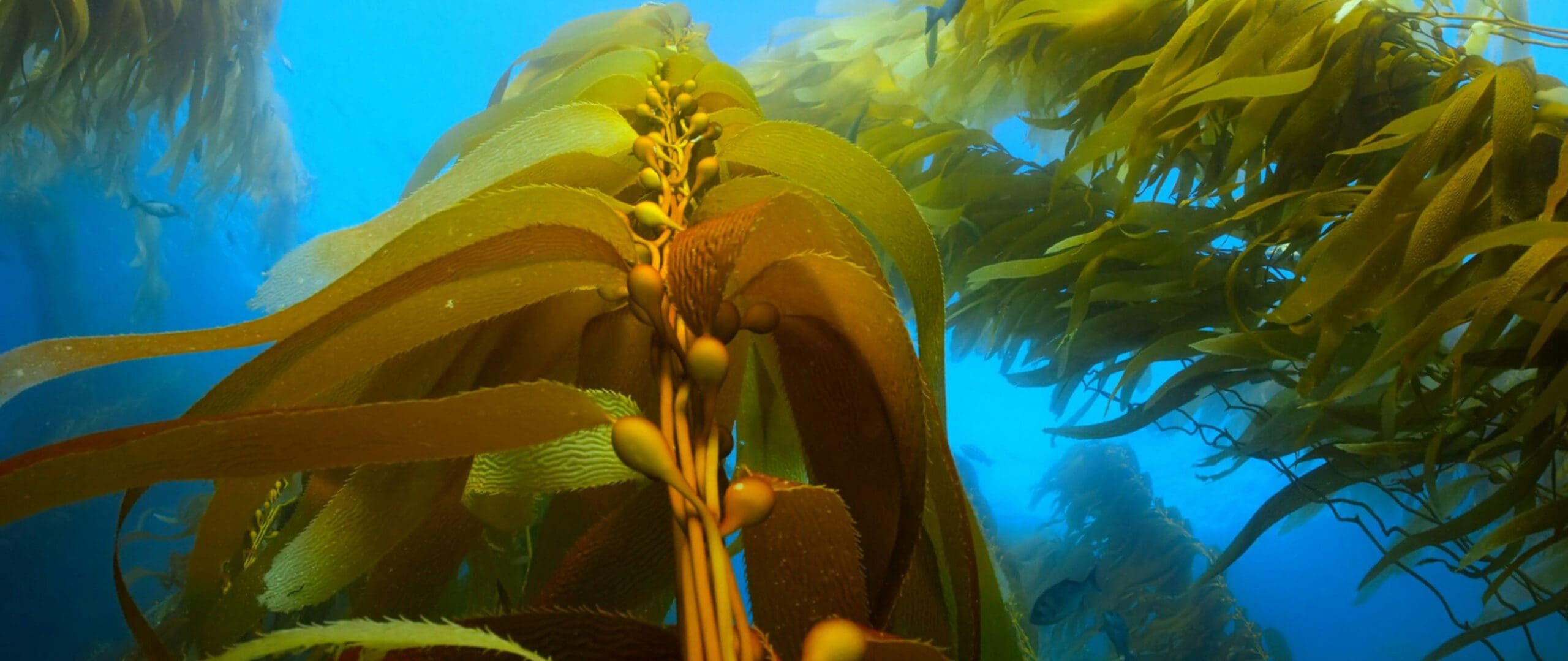Reduce
Decarbonizing the Global Economy for a Healthy Ocean
The ocean’s health is inextricably linked to the level of greenhouse gas concentrations in the atmosphere. Increasing emissions lead to increased levels of greenhouse gases in the atmosphere, which result in warming ocean waters, ocean acidification, deoxygenation, and sea level rise. All of these stresses threaten marine life, reduce biodiversity, and disrupt the critical services the ocean provides.
Dramatically reducing emissions and also removing billions of tons of carbon dioxide (CO₂) from the atmosphere are both crucial to mitigating these harmful impacts, ensuring a healthy, resilient ocean for future generations.
The ocean has immense potential to provide solutions that reduce greenhouse gas emissions by replacing carbon-intensive goods and services that society needs with low-carbon alternatives.
Most notably, the ocean can provide society with low-carbon energy, low-carbon food, and low-carbon transportation. Fully developing these sectors and other ocean-based alternatives is essential to help the world meet critical targets for decarbonizing the global economy.
Energy
The ocean represents a vast and largely untapped source of renewable energy.
Marine renewable energy sources are numerous, and most are largely underdeveloped. They include technologies that harness the natural movement of water, including waves, tides, and river and ocean currents. Marine energy can also be derived from temperature differences in water through a process known as ocean thermal energy conversion (OTEC). Another potential marine renewable energy source comes from salinity gradients, where energy is created from the difference in salt concentration between two fluids, commonly fresh and salt water (e.g., when a river flows into the sea). Other ocean-based energy sources include offshore wind, which is already a rapidly growing sector that provides a sustainable source of electricity.
Marine renewable energy offers several benefits to the clean energy transition, including greater consistency and predictability compared to renewables such as wind and solar energy. In the case of wave energy, there is a potential match between resource peak and energy demand. For example, one study noted that British Columbia’s energy consumption peaks in the winter when the available wave resource is also at its strongest; this same characteristic is true along the rest of North America’s Pacific Northwest coast. Some ocean-based energy technologies could also help to power other climate mitigation approaches, such as sustainable aquaculture and marine carbon dioxide removal as they begin to move offshore to scale operations — potentially having an even greater impact on reducing net greenhouse gas emissions. The energy captured can be used for different kinds of useful work, including electricity generation, water desalination, and water pumping.
However, most marine energy technologies are at early stages of development and merit much greater investments in research and development to determine what contributions they could make toward a decarbonized energy system. The U.S. Department of Energy (DOE) supports research and development to reduce the cost of marine energy technologies. This includes TEAMER, a program offering marine energy technology developers and researchers access to U.S.-based test facilities and technical expertise. The European Union plans to have at least 1 GW of installed capacity by 2030 and 40 GW by 2050.

Food
The ocean can also help the world meet its growing food needs with lower-carbon food products. Aquaculture in particular – the farming of aquatic organisms and plants, including fish, shellfish, and seaweed – can provide sustainable sources of protein and nutrition for a growing global population, with a lower carbon footprint than most land-based food production systems. Expanding sustainable aquaculture, especially increasing the amount of plant-based food products from the sea, will be critical to a lower carbon future. Wild fisheries are also important contributors to lower carbon food, but impacts to the ocean floor and overall decarbonization of fishing fleets are both important priorities for this sector in the years ahead.

Transportation
According to the International Maritime Organization, 90 per cent of the world’s goods move around the globe on ships. Marine shipping currently accounts for around three percent of total global greenhouse gas emissions. In July 2023, the International Maritime Organization adopted a revised greenhouse gas strategy committing the global shipping industry to achieving net zero greenhouse gas emissions by 2050. Emissions reduction in this sector will come from a number of measures, including the implementation of energy efficiency measures and the development of alternative shipping fuels such as methanol and ammonia powered by renewable energy sources. This requires a systems approach with buyers committing to invest in solutions (e.g., the Zero Emissions Maritime Buyer Alliance) alongside ship operators, engine manufacturers, and ports.

Agriculture
The ocean offers several ways to reduce emissions from agriculture on land. For example, red seaweeds in the Asparagopsis genus have shown high efficacy in reducing methane emissions from cattle when included in their diet. Plant stimulants made from seaweed extracts are innovative products designed to enhance plant growth and resilience through mechanisms beyond simple nutrient supply. These stimulants have been found in initial agricultural trials to generate about 50 percent fewer CO₂e emissions per application than chemical fertilizers. (Note: CO₂e expresses the impact of different greenhouse gases in terms of the amount of CO₂ that would have the same global warming potential.)

Industry
Ocean-derived products also have the potential to reduce and/or replace some industrial emissions. While commercial activity to develop seaweed-based biofuels is very low, several research initiatives are underway. For example, the U.S. DOE’s Bioenergy Technologies Office (BETO) is funding laboratory scale R&D on conversion of seaweeds and seaweed blends to renewable fuels and bioproducts.
Seaweed also has potential as a construction material, with a 2022 review identifying the use of different species of seaweed in the form of fibers or additives in panels, polymer composites, pavement, and adobe and ash in Portland cement composites. Seaweed used in construction applications has a long potential lifespan as a product. This enables longer term storage of sequestered CO₂.
Seaweed-based bioplastics are also at an early stage of development, but prospective life cycle assessments show their potential to have lower emissions as compared to conventional plastics at scale.

The ocean can provide low-carbon energy, low-carbon food, and low-carbon transportation
What We Are Doing
Ocean Visions completed an intensive analysis to identify the highest-leverage opportunities to advance select ocean-based decarbonization pathways. The analysis included more than 20 ocean-based decarbonization pathways and identified opportunities that have not received sufficient investments of time, energy, and resources to reach their potential. Our analysis included a review of published materials and synthesis reports by organizations such as the High Level Panel for a Sustainable Ocean Economy and the International Renewable Energy Agency, paired with original analysis from Ocean Visions, to develop a comprehensive view of the best opportunities.
Based on our analysis and conversations with more than 40 experts from industry, academia, government, and non-profits working on ocean-climate solutions, we identified two areas for Ocean Visions to focus its attention: “Low-Carbon Seaweed-Based Products” and “Marine Renewable Energy to Power Marine Carbon Dioxide Removal and the Blue Economy.”
Low-Carbon Seaweed-Based Products
Opportunity Scope
- The utilization of marine biomass, particularly seaweeds, presents an opportunity to meet global decarbonization targets by replacing carbon-intensive products with lower-carbon alternatives. In some cases, seaweeds can also contribute directly to reducing methane emissions, such as the use of seaweed-amended cattle feed.
- One analysis suggests that replacing high-emissions food products,including land-based proteins such as beef with seaweed-based alternatives could potentially avoid one billion tons (a gigaton) of CO₂e emissions per year by 2050.
- Marine biomass can be used to create various low-carbon products that replace fossil fuel intensive ones, including biofuels, biostimulants, and replacements for fossil-fuel derived plastics.
In 2025, building from our strength and experience as a convener and a developer of collaborative work products, we will undertake a road mapping process to examine the full potential for marine algal biomass to contribute to decarbonization along the entire value chain. This area of work will draw upon existing strengths of Ocean Visions in ocean science and conservation and merge in new focal areas in industrial processing and value chains. Once released, this road map will guide our work and that of other interested parties to coalesce around key opportunities to advance a sustainable marine biomass industry.
Marine Renewable Energy to Power Marine Carbon Dioxide Removal and the Blue Economy
Opportunity Scope
The ocean represents a vast and largely untapped source of renewable energy. Marine Renewable Energy (MRE) technologies, including wave, tidal, current energy and ocean thermal energy conversion, could significantly contribute to global decarbonization efforts. Our analysis suggests that MRE could reduce emissions by about 75 MT CO₂ e per year in the 2030s and beyond.
Equally critical, MRE could help support the scaling of marine carbon dioxide removal (mCDR) and other climate mitigation technologies offshore, further amplifying climate impact. To initiate our work on MRE, Ocean Visions will do the following:
- Expand our Launchpad accelerator program to include early-stage companies working on MRE. Drawing on experts from the Ocean Visions Network, Launchpad can provide scientific, technical, and policy advice to inventors. We will work to build an ecosystem to support the development of first-of-a-kind projects and help companies reduce their technology risk. This program, expected to kick off in late 2025, will focus on the applicability of marine renewables in powering offshore and coastal industries.
LEARN MORE
For a deeper dive, view our Analysis of Decarbonization Approaches. Watch for more information on the program and please contact Nikhil Neelakantan if you’re interested in working with us.


